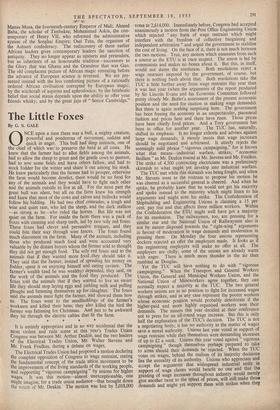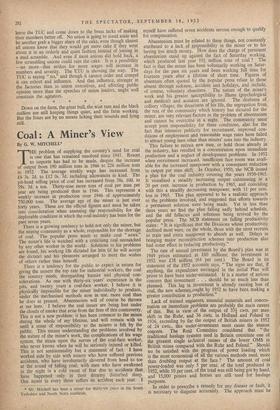The Little Foxes
By G. S. GALE 0 NCE upon a time there was a bull, a mighty creature, powerful and ponderous of movement, sudden and quick in anger. This bull had deep instincts, one of the chief of which was'to preserve the herd at all costs. He knew that the farmer had to allot fields among the animals, had to allow the sheep to graze and the gentle cows to pasture, had to sow some fields and leave others fallow, and had to stock fodder for the winter and share it out among his stock. He knew particularly that the farmer had to prosper, otherwise the farm would become derelict, there would be no food for any of the animals and they would have to fight each other and the animals outside to live at all. For the most part the great bull was silent, but all on the farm knew his strength and knew that most of the cows and calves and bullocks would follow his bidding. He had two chief comrades, a tough and wise and quiet ram, who led the sheep, and the dark stallion —as strong as he—who ruled the horses. But life was not quiet on the farm. For inside the farm there was a pack of foxes with cunning and sharp teeth, led by two wily red foxes. These foxes had clever and persuasive tongues, and they could bite their way through wire fences. The foxes found much discontent on the farm. Many of the animals, including those who produced much food and were accounted very valuable by the distant buyers whom the farmer sold to thought they did not get enough food. The wily red foxes said to the animals that if they wanted more food ,they should take it. They said that the farmer, instead of spending his money on fodder, spent it on enjoying himself and eating caviare. The farmer's wealth (and he was wealthy) depended, they said, on the work of the animals and the food they produced. The foxes told the animals that if they wanted to live an easier life they should stop laying eggs and yielding milk and pulling ploughs and fattening themselves up for slaughter. The foxes said the animals must fight the farmer, and showed them how to. The foxes went to the smallholdings of the farmer's . workmen and killed their hens; they also killed the bird the farmer was fattening for Christmas. And just to be awkward they bit through the electric cables that lit the farm. * * * * It is entirely appropriate and in no way accidental that the most violent and rude scene at this year's Trades Union Congress was between Mr. Arthur Deakin, and the two leaders of the Electrical Trades Union, Mr. Walter Stevens and Mr. Frank Foulkes, during a debate on wages.
The Electrical Trades Union had proposed a motion declaring the complete opposition of Congress to wage restraint, stating the fundamental concept of the trade union movement to be the improvement of the living standards of the working people, and supporting " vigorous campaigning " by unions for higher Wages. It was this motion—almost unexceptionable, one might imagine, for a trade union audience—that brought down the wrath of Mr. Deakin. The motion was lost by 5,018,000 votes to 2,614,000. Immediately before, Congress had accepted unanimously a motion from the Post Office Engineering Union which rejected " any form of wage restraint which might interfere with the freedom of collective bargaining and independent arbitration " and urged the government to stabilise the cost of living. On the face of it, there is not much between the two motions. True, any motion which emanates from such a source as the ETU is at once suspect. The union is led by communists and makes no bones about it. But this, in itself, would not damn the resolution. Both resolutions reject a wage restraint imposed by the government, of course, but there is nothing fresh about that. Both resolutions take the TUC a little further away from wage restraint this year than it was last year (when the arguments of the report produced by Sir Lincoln Evans and his Economic Committee followed pretty closely Mr. Butler's assessment of the present economic position and the need for caution in making wage demands). But there is again nothing surprising here. The government has been freeing the economy in an unspectacular, piecemeal fashion and prices here and there have risen. Those prices have been chiefly food prices. And a Tory government has been in office for another year. The TUC has, naturally, shifted its emphasis. It no longer exhorts and advises against large wage demands; it merely insists that wage increases should be negotiated and arbitrated. It utterly rejects the seemingly mild phrase " vigorous campaigning," for it knows what that means—industrial warfare, strikes, " economic Bedlam " as Mr. Deakin roared at Mr. Stevens and Mr. Foulkes. The strike of 4,500 contracting electricians was a preliminary skirmish to what might yet develop into industrial warfare.
The TUC met while this skirmish was being fought, and when Mr. Stevens went to the rostrum to propose his motion he was cheered as a successful general is cheered. And when he spoke, he probably knew that he would not get his majority and spoke instead to the minority which might listen to his arguments and might note his strike. The Confederation of Shipbuilding and Engineering Unions is claiming a 15 per cent. pay rise and that affects three million workers. Within the Confederation the ETU might well have got a majority for its resolution. The railwaymen, too, are pressing for a similar rise and the National Union of Railwaymen also is not by nature disposed towards the " right-wing " arguments in favour of moderation in wage demands and moderation in pressing them. On Monday the four unions, representing dockers rejected an offer the employers made. It looks as if the engineering employers will make no offer at all. The employers are chilly; some of the unions are already warm with anger. There is much more thunder in the air than rumbled at Douglas. Yet the TUC will have nothing to do with " vigorous campaigning." When the Transport and General Workers Union, the General and Municipal Workers Union, and the National Union of Mineworkers agree together, they can normally expect a majority at the TUC. The two 'general workers unions are in no position to fight for increased wages through strikes, and in any case represent the poorer workers whose economic position would probably deteriorate if the higher-paid and more highly organised workers won their demands. The miners this year decided at their conference not to press for an all-round wage increase. But this is only half the explanation of the TUC's decision. The TUC is not a negotiating body; it has no authority in the matter of wages save a moral authority. Unions last year voted in support of wage restraint while they themselves were demanding increases of up to £2 a week. Unions this year voted against " vigorous campaigning " though themselves perhaps prepared to take' to arms should their demands be' rejected. When the TUC votes on wages, behind the realism of its majority decisions lies the unreality of its authority. Unions who appreciate and accept the arguments that widespread industrial strife in support of wage claims would benefit no one and that tho granting of wage increases throughout industry would merely give another twist to the spiral of prices, will still make those demands and might yet support them with strikes when they, leave the TUC and come down to the brass tacks of making their members better off. No union is going to stand aside and let another grab a bigger share of the cake, even though almost all unions know that they would get more cake if they went about it in an orderly and quiet fashion instead of joining in a mad .scramble. And even if most unions did hold back, a few scrambling unions could ruin the cake. It is a possibility —no more—that strikes for more wages will increase in numbers and severity. The 'ETU is showing the way. The TUC is saying " no, and though it 'cannot order and compel it can exhort and influence. And that influence, stronger in the factories than in union executives, and affecting public opinion more than the speeches of union leaders, might well constrain the agitators.
* * * * Down on the farm, the great bull, the wise ram and the black stallion are still keeping things quiet, and the farm working. But the foxes are by no means licking their wounds and lying still.



































 Previous page
Previous page